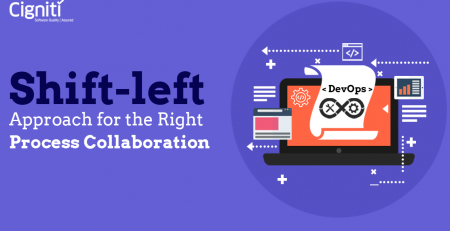The Growing Need for App Security Management & the Role of DevOps
Technology has always posed the greatest litmus test for security, as Technology demands a secure, fast, and flexible interface. These demands are prominently evident in the case of application security management. Applications are at the heart of business operations today, which implies that security testing begins from the inception of the software development cycle and continues throughout the application development process.
Explosion of mobility services and devices in the past decade has amplified the need for testing the security of a wide array of business-critical and enterprise level applications leveraged for commercial success and desired user experience. Application security management has always been a fundamental process, as these applications rule the technology and information landscape. For example, the partnership between Cigniti and Kiuwan allows users to enjoy the benefits of an all-inclusive Application Security platform to test and secure enterprise applications from cyber-attacks, incorporating SLA compliance within the relevant IT frameworks and standards.
With DevOps, the importance of application security management has further intensified.
A Knowledgeable Defense
The old adage – ‘knowledge is power’ – has never made more sense than today in the context of application security. The potential for threats holds true throughout the development process and the DevOps approach helps to detect these threats faster. There is a constant need for continuous and early vulnerability detection, as it provides the much-needed protection from the risks associated with third-party libraries and requires automatic threat detection mechanism.
Following is an overview of the vital aspects involving application security management.
DevSecOps (Continuous and Early Detection)
We know that “DevOps introduces an approach of continuous delivery and continuous testing…” and that this extends many great application advantages. The quote has come from a story that also explains in an absolute manner the importance and role of DevSecOps stating, “Security teams can take advantage of this delivery approach to reduce security risks…they can identify security vulnerabilities early in the life-cycle and mitigate the effects early.”
DevSecOps is the means and the process with which continuous and early vulnerability detection is accomplished. It blends security testing in the coding process and creates a culture where every function is involved in ensuring the quality and security of the applications. This begins with the collaboration of the developers and the security teams and then filters through every individual in the organization. The threats in the application development process may also come from within the development process.
Third-Party Libraries Risks
The time, effort, and money saved using third-party libraries makes the temptation too great to ignore and often too practical to not consider. The time involved in creating libraries versus integrating or implementing them into your development process can be considerable. The question is more about how to safeguard against vulnerabilities created by using third-party libraries.
One such resource that is used to defend against such vulnerabilities is the Open Web Application Security Project (OWASP). OWASP provides developers with updated “documentation and issues software tools to bolster security efforts.” For organizations or companies who only run a limited number of applications, it might be possible to individually monitor and track every library process. However, at some point it simply becomes unrealistic, and this is when resources such as OWASP become invaluable.
Automating security measures to provide ongoing and reinforced security for applications has also become a useful tool for security management professionals, such as Kiuwan Security.
Automatic Threat Evaluation
Throughout the SDLC there will be vulnerabilities and threats that are either new or discovered and need to be dealt with immediately. Recognizing these ongoing issues and detecting (and in some circumstances even predicting) such vulnerabilities is the strength of an automatic threat evaluation system.
It has been estimated that ‘only 81% of enterprises and 70% of small-to-medium businesses have adopted DevOps, but only 29% of mobile apps, on average, undergo vulnerability testing…”
Having the ability to analyze apps before deployment using static and dynamic methods via an automated system is a growing need. Moreover, it requires constant vigilance to ensure application security throughout the entire development lifecycle.
Better Technology Demands Better Security
Technology yet needs to see anything that matches the speed of DevOps. This is great for developers and operations specialists. The way security testing teams view these changes totally depends on the tools available for them to use.
Using a DevSecOps structure, monitoring and tracking activities of third-party libraries can be left to automation. In this way, continuous defense and alert systems become necessary tools. With added skills in DevSecOps, application development will prove to be more effective, fast, and most importantly, secure.
In theory, DevOps should enhance security and should become an integral part of the software development process. Third-party libraries will be secure and safe to use and automation will be a round-the-clock watchdog.
Security is Priority One
The software development process and popularity of applications was once a tedious and long-enduring process. That process was a buffer for security teams, giving them the time and luxury of testing, evaluating, and securing applications. Though DevOps has removed that buffer, it now poses its own challenges that must be overcome.
The emphasis on security hasn’t lessened but instead increased. DevOps is the face of the future – if not the face of today’s technology. With increasing cyber-attacks and security risks in the virtual work, the threat to the applications is only growing.
With a view to extend the best of our services and partnerships to our customers, Cigniti has entered into a strategic partnership with Kiuwan to offer high-level visibility to the security risks to your applications.
Kiuwan is a software as a service (SaaS) static program analysis, multi-technology platform for software analytics, covering code security, code analysis, life cycle and governance of application portfolios. It is one of the tools in the Open Web Application Security Project (OWASP) for source code analysis tools list.
Connect with us to effectively leverage our strategic partnerships and build a secure interface for your applications.





Leave a Reply